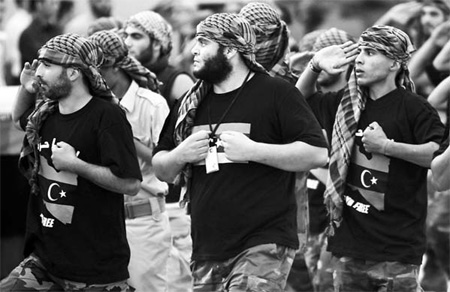Libya's new leaders struggle to secure loose weapons
 0 Comment(s)
0 Comment(s) Print
Print E-mail
China Daily via Agencies, November 4, 2011
E-mail
China Daily via Agencies, November 4, 2011
More than two months after the fall of Tripoli, Libya's new leaders are still struggling to secure massive weapons depots, stop the smuggling of munitions out of the country and disarm thousands of fighters who brought down Muammar Gaddafi's rule.
 |
|
Forces loyal to Libya's new rulers take part in a military parade organized by the municipality of Tripoli on Wednesday to celebrate the ouster of former leader Muammar Gadhafi. [China Daily via Agencies] |
The international community has offered to help, but also expects Libyans to step up. However, the interim leadership - in limbo until the formation of a new government mid-month - may not be up to the task. Libya's temporary leader, responding to increasingly urgent international appeals, said he can't do much because he lacks the funds.
As recently as last month, international researchers found an unguarded weapons site with thousands of crates of rocket-propelled grenades and anti-aircraft rounds in the Libyan desert.
Libyan authorities also discovered two military compounds housing chemical weapons that an official said were ready to be assembled and used, as well as another site containing 7,000 drums of raw uranium. The officials would not give further details. Chemical weapons inspectors arrived in Libya this week to start securing the sites, a UN official said.
Failure to secure weapons has fueled fears that the material could fall into the wrong hands, including shoulder-held anti-aircraft missiles that could pose a threat to civil aviation.
Compounding the problem, the myriad brigades of revolutionary fighters so far have refused to disarm, and there has been a rash of personal score-settling by armed men from rival groups, including a shootout at a Tripoli hospital this week. Libyan leaders used to play down the danger of the massive weapons presence, but are now increasingly worried.
UN Secretary-General Ban Ki-moon visited Libya on Wednesday to personally deliver his concern about the unsecured weapons.
Earlier this week, the UN Security Council urged Libyan authorities to take quick action, saying it fears the weapons, especially shoulder-held missiles, could fall into the hands of armed groups and terrorists.
The United States has previously sent weapons experts to Libya and has contributed about $40 million toward destroying surface-to-air missiles, which can be used to shoot down planes.
Mustafa Abdul-Jalil, Libya's interim leader, asked the international community on Wednesday to release more of the Gaddafi government's billions of dollars in frozen assets to use in programs to disarm fighters and control weapons.
In the vacuum, the weapons chaos persists.
Weapons smuggling across the border into neighboring Egypt "happens all day and night", controlled by powerful clans in the area, said Adel al-Motirdi, commander of the patrol units on the two countries' border.
"We can do nothing to stop it," he said. Among the contraband were machine guns and rocket launchers.
Israeli officials have said some of those weapons have reached the Hamas-ruled Gaza Strip, which shares a border with Egypt.





